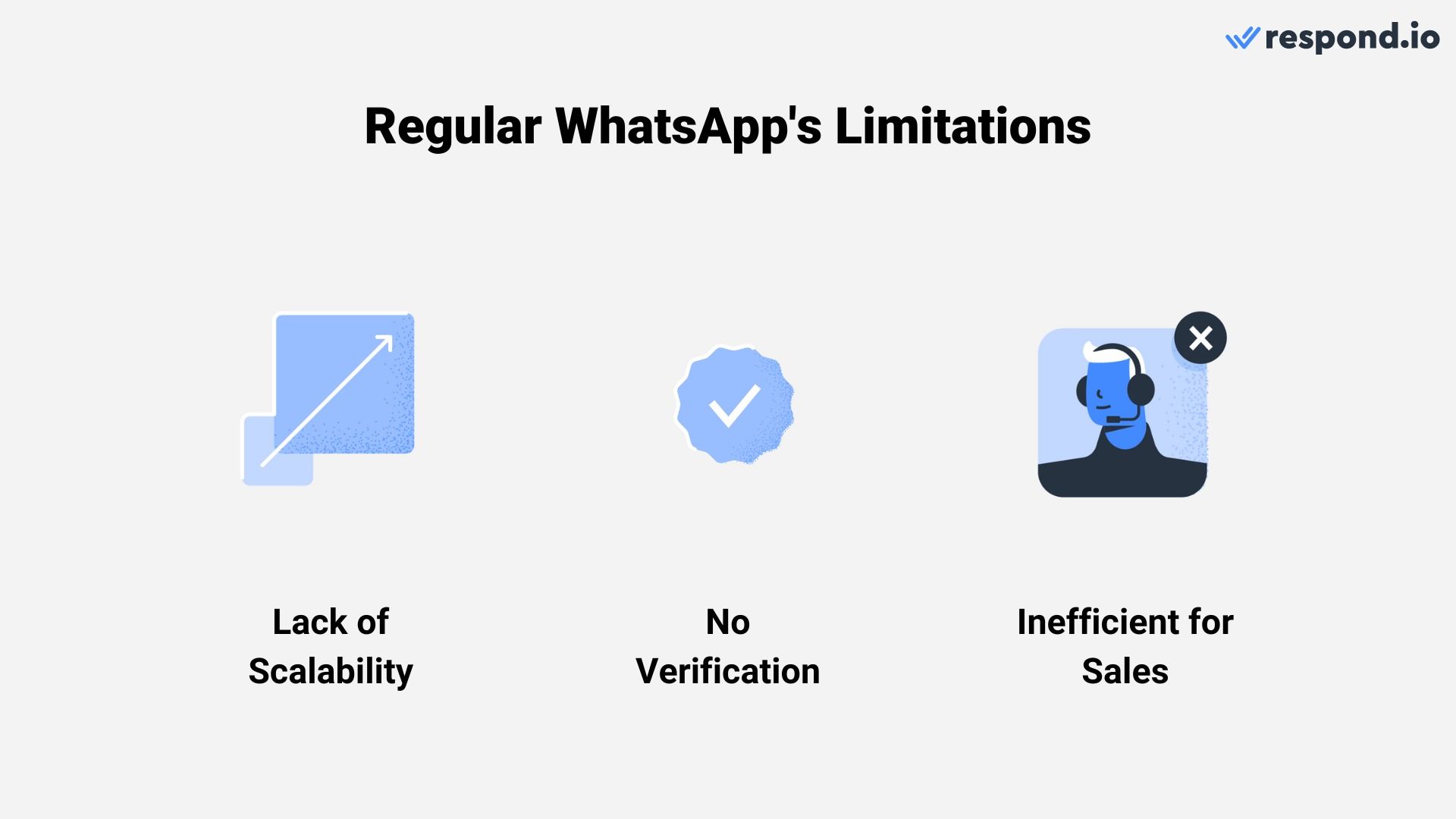

Today, WhatsApp is among the most widely used messaging apps worldwide, with over 2 billion active users. But beyond personal communication, WhatsApp is increasingly used for sales and marketing purposes. Unfortunately, regular WhatsApp can be limiting for this which is why there are two options for businesses: WhatsApp Business App and WhatsApp API, also known as WhatsApp Business API.
In our WhatsApp vs WhatsApp Business article, we’ll cover why you should consider moving to either WhatsApp Business App or WhatsApp API if you’re currently using regular WhatsApp for sales and marketing before comparing the two in detail.
WhatsApp vs WhatsApp Business: Why Regular WhatsApp for Sales and Marketing is Limiting
Standard WhatsApp is a proven staple for communicating with friends and family, but it falls short for business operations. While it can technically be used by solopreneurs and very small businesses, its weaknesses become apparent as you scale WhatsApp sales and marketing efforts.

Inability to Scale
Regular WhatsApp was primarily designed for personal use. When your teams need to manage hundreds, if not thousands, of conversations daily, WhatsApp’s limit of allowing only 5 devices (including your primary device) per single account makes it virtually impossible to handle high volumes of interactions efficiently.
Lack of Verification
Between WhatsApp vs WhatsApp Business, standard WhatsApp doesn't support the verification of accounts. This is a shame as WhatsApp green tick verification helps establish trust and credibility with customers and prospects. Without this, it can be difficult to differentiate between legitimate businesses and scammers.
Inefficiency for Sales Conversations
Using WhatsApp for sales operations requires more than just a chat interface. Teams need to track conversations, have easy access to chat histories and collaborate with other team members by handing off conversations as needed. Unfortunately, standard WhatsApp does not offer these features, leading to potentially missed opportunities when selling on WhatsApp.
Why Use WhatsApp Business App for Sales and Marketing?
WhatsApp Business App is one of the two options businesses can opt for and was primarily designed for smaller businesses. Unlike WhatsApp API, WhatsApp Business App is entirely free to download and is available on both Android and iOS. Its familiar and accessible WhatsApp features, such as quick replies and labeling, make it easy for teams to start using it.
WhatsApp Business App is often the go-to solution for smaller business owners who manage low volumes of customer interactions, such as local stores and restaurants. It suits those with a simple catalog of goods or services to display and who need basic automation features like automated greeting and farewell messages and is ideal for those not ready to invest in alternatives like WhatsApp API.
Pros of WhatsApp Business App
WhatsApp Business App offers many advantages for smaller businesses compared to regular WhatsApp, though it also has some limitations. But before we go into that, here’s why it's so appealing:
User-Friendly Interface: WhatsApp Business is straightforward to use, with a familiar interface and a low learning curve. This is ideal for users who may not be tech-savvy or have the time to learn more complicated tools.
Essential Features: WhatsApp Business App provides the essential tools any small business needs to succeed, including a business profile, product catalog and broadcast messages (limited to a single message) along with offering simple auto reply messages.
Cons of WhatsApp Business App
While the WhatsApp Business App is fantastic for small businesses, offering most of what they need, it also has some drawbacks:
Lack of Integration: Integrations with Customer Relationship Management (CRM) tools or other third-party software are not currently available. This restriction makes tracking and managing customer conversations more difficult.
Number of Users: WhatsApp Business App only supports up to four users, which is a significant drawback for businesses with larger teams or smaller businesses looking to scale their sales and marketing operations with multiple users.
Turn conversations into customers with respond.io's official WhatsApp API ✨
Manage WhatsApp calls and chats in one place!
Why Consider WhatsApp API for Sales and Marketing?
For larger businesses looking for a more robust solution that can scale with their sales and marketing goals, WhatsApp API offers a powerful option, allowing businesses to manage, automate and monitor conversations.
WhatsApp API is a fantastic solution for larger businesses because they often have more complex and extensive communication needs (and larger budgets). The ability to automate interactions, start and receive calls, send bulk messages, integrate with business tools and customize workflows makes handling large-scale communication efforts a much smoother affair.
WhatsApp is also refining how marketing messages are delivered. Since March 2025, message volume isn adjusted based on engagement, ensuring businesses reach the most responsive audiences.
Pros of WhatsApp API
While we’ve established that medium to larger businesses often opt for WhatsApp API, let’s take a closer look at some of its standout features:
Customizability: WhatsApp API allows businesses to tailor the platform to their specific needs, enabling them to create custom workflows. However, do note that this does require technical experience to set up properly. However, businesses targeting US customers should note that since April 2025, WhatsApp will temporarily pause marketing messages to US numbers as part of ongoing platform improvements.
Verification: WhatsApp API can provide you with the iconic Verified Green Tick, which can go a long way in promoting brand legitimacy and trust, especially with new customers.
Integration: WhatsApp API offers the freedom and ability to integrate with a wide variety of CRM systems or other relevant business tools. WhatsApp integration is especially for purposes such as monitoring, which promotes transparency in customer communications.
Scalability: WhatsApp API essentially allows for unlimited users on a single number, meaning that regardless of team size, everyone who needs to be involved, can be involved.
Cons of WhatsApp API
Though WhatsApp API can potentially offer a lot more to businesses, it does not come without its own set of cons that include the following:
Lack of Interface: Unlike the Business App, WhatsApp API does not come with any readily usable interface which means that businesses will need to connect it manually with an existing messaging software, such as respond.io, to communicate with leads and customers.
Complexity: While WhatsApp API offers flexibility and a greater degree of customization, it still requires technical expertise and knowledge to properly take advantage of.
Pricing: While WhatsApp API isn't free, what it brings to your business can make it worth the investment. Businesses need to cover the costs for three things: their phone number, a messaging inbox and WhatsApp's per-message pricing charges.
WhatsApp Business App and WhatsApp API: A Comparison
Now that we’ve covered why you should consider either solution along with their main pros and cons, let’s take a side-by-side look at how both solutions differ:
Key Differences Between WhatsApp Business App and WhatsApp API
Feature | WhatsApp Business App | WhatsApp API |
Target User | Small business | Medium to large-sized business |
Pricing | Free | Usage-based |
Green Tick Verification | No | Yes |
Calls | Yes | Yes |
Automation | Yes (Basic) | Yes (Advanced) |
Business Profile | Yes | Yes |
Broadcasting | Yes (Up to 256 contacts) | Unlimited |
Team Inbox | No | Yes |
Product Catalog | Yes | Yes |
Automated Responses | Yes | Yes |
User Limit | 5 | Unlimited |
Integrations | No | Yes |
Setup Complexity | Easy | Moderate |
Is WhatsApp API Better Than WhatsApp Business App?
Time to answer the big question: which is the better option?
This may seem like a cop-out, but the answer depends entirely on your unique business needs and future plans. Both are definite upgrades from using regular WhatsApp for sales and marketing purposes, however.
WhatsApp Business App is ideal for small businesses, providing essential features without the need for technical expertise. It’s practical and cost-effective, making it perfect for businesses with a lower volume of customer interactions.
On the other hand, the WhatsApp API, while more suitable for medium to large-sized businesses, can be seen as a long-term investment that grows and scales with your company. It offers advanced features like automation, detailed analytics and CRM integration.
That said, transitioning early from the WhatsApp Business App to the API can make it easier for your teams to start adopting new processes and avoid the potential headaches caused by losing chat histories during migration, whenever that may be on your timeline.
Want if I Don't Want to Lose the WhatsApp Business App?
To use WhatsApp API, businesses typically need a phone number that’s not linked to any existing WhatsApp account and a Meta Business Portfolio. Then, they’ll choose a WhatsApp Business Solution Provider (BSP), like respond.io, to get access to a WhatsApp API account.
However, we understand that switching from the WhatsApp Business App to the API can feel like a big leap — especially if you’re used to the app and don’t want to risk losing your chat history or contact list. That’s why WhatsApp Coexistence is a game changer.
It allows you to use the same phone number for both the WhatsApp Business App and WhatsApp API. You can keep your familiar interface, continue accessing chat history on the app, and still unlock the benefits of WhatsApp API on respond.io — including multiple users, automation, CRM integrations, AI-powered assistance, and more.
So, if you're hesitant about going all in on the API, this new feature lets you try it with zero commitment. You can always switch back to just using the app if needed. Want to get started? Sign up for a free respond.io account and experience the best of both worlds.
Turn conversations into customers with respond.io's official WhatsApp API ✨
Manage WhatsApp calls and chats in one place!
Further Reading
Did you enjoy our article about WhatsApp vs WhatsApp Business and are interested in learning more? You might find these articles helpful:






































 Electronics
Electronics Fashion & Apparel
Fashion & Apparel Furniture
Furniture Jewelry and Watches
Jewelry and Watches
 Afterschool Activities
Afterschool Activities Sport & Fitness
Sport & Fitness
 Beauty Center
Beauty Center Dental Clinic
Dental Clinic Medical Clinic
Medical Clinic
 Home Cleaning & Maid Services
Home Cleaning & Maid Services Photography & Videography
Photography & Videography
 Car Dealership
Car Dealership
 Travel Agency & Tour Operator
Travel Agency & Tour Operator




